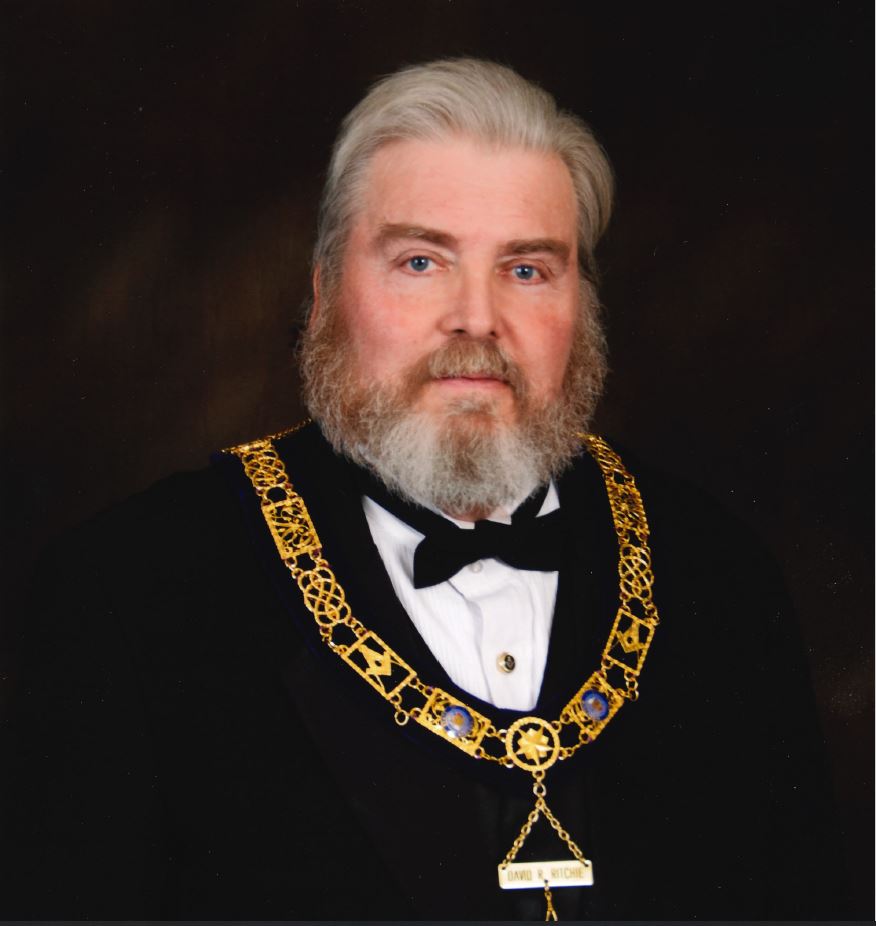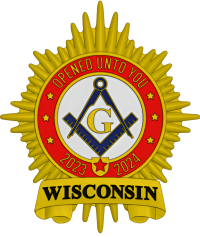By Kenyon Bennett , The Dodgeville Chronicle
Freemasons, also known as Masons, are members of the world’s oldest fraternal organization that was begun as a guild for stonemasons, skilled builders, in Europe during the Middle Ages. Tracing the organization to a specific date is futile. That knowledge has been lost to history. Secret practices, such as symbolic handshakes and greetings that Freemasons use, are often shrouded in mystery. Dodgeville has its Masons, perhaps best known for trying to help others in their community.
The Dodgeville Masonic Lodge #119, chartered June 13, 1860, is located at 200 W. Chapel St. The current building, remodeled in recent years, was built in 1929 and cost $55,000, Royce “Ross” Jones, the fraternity’s secretary, said. Today, regular Lodge meetings are conducted the third Thursday of each month. The Masons hold six pasty sales each year at the Lodge to raise money to donate to local organizations. The Masons recently donated $1,000 to assist the Dodgeville Mustang Cheer/Pom Squad, a middle school cheerleading group, to buy red, white, and blue uniforms. The squad wore the uniforms during the final 2023 Badger Honor Flight event at Dane County Regional Airport in Madison and welcomed veterans returning home from their Washington, D.C., trip Nov. 4.
The Lodge’s philosophy involves more than one tenet. “The mission of Freemasonry in Wisconsin is to teach and demonstrate a fraternal way of life that promotes brotherhood and self-improvement through education, moral standards, charity, and community involvement to foster personal growth and improve the lives of others,” the Lodge’s website states. The fraternity is guided by three principles: brotherly love, relief, and truth.
Dodgeville’s fraternity members with specialized titles and duties include Brian Pishion, Master; Jim Schoville, Senior Warden; Charles Pishion, Junior Warden; Orville Olson, Lodge Treasurer and Chaplain; Royce Jones (pictured above reading documents from the bank vault at the Dodgeville Masonic Lodge), Lodge Secretary; Dalton Luckey, Senior Deacon; Kurt Erickson, Junior Deacon; Scott Althaus, Senior Steward; Brad Pishion, Junior Steward; Mike Hoppenjan, Counselor; and Leonard Pishion, Tyler.
Lodge
Jones provided a building tour. A new heating system keeps rooms comfortable. The meeting room has new chairs, curtains, and an improved altar with a podium. A new desk was recently donated to the Lodge.
Artifacts are kept in the Lodge’s Heritage Center and other rooms in the building. “We have Bibles that go back to the 1800s,” Jones said before stopping by 19th-century school records. “What is interesting to me is right here. It’s a register for students for school. Look at the year on that, 1875. It’s almost 150 years old.”
Objects housed at the Lodge are often symbolic. Jones held up a miniature trowel. Masons used trowels when working with mortar and stones or bricks. “We use it now to cement relationships between our brothers. The square is to square our actions. The levels – to be on the level. The compass, that’s to draw circles. You don’t step outside that circle. That way you never get in trouble. So, that’s where the square and compass are coming from. The letter ‘G’ is for God,” Jones said. Geometry is also associated with the early stonemasons whose mathematical instruments and knowledge allowed buildings and monuments to be constructed.
Jones pointed to a stack of symbolic suitcases in the Lodge. Today, suitcases represent traveling. “Regular stonemasons, they traveled from country to country when they built the cathedrals and stuff like that all through Europe,” Jones said. As mentioned earlier, Freemasons take their names from the early stonemasons. Today’s Masons are divided into two rites, the York Rite and the Scottish Rite, each having a special significance.
Other artifacts displayed were decorative knives, teacups, a vintage radio, a banker’s safe, suitcases, tiaras, old newspapers, many framed 19th-century portraits, and additional items.

Jones, who has a workshop at home, enjoys constructing useful objects for the Lodge. Different shelves adorn the building’s interior. “These were old wooden tables downstairs in the basement. So, we tore them apart and recycled them and turned them into a bookshelves. We’ve got 16 of them. So, the wood on them is over 100 years old,” he said.
Nelson Dewey matchbox
The Heritage Center holds objects in a glass-enclosed display case. Jones held up a decorative matchbox with the Masonic symbol on it. Nelson Dewey, Wisconsin’s first governor, had owned it. Jim Jewell, a cemetery monument dealer in Richland Center, Wisconsin, later acquired it.

“This came from Jim Jewell’s family. I thought I’d better put it in the Heritage Center. I looked at it and thought, Oh, this is just a lighter. I didn’t open it up. So, I carried it in my pocket for about three weeks, and I figured, well, I better take it out and put it in the Heritage Center. When we got looking at it, I said, ‘Gee, it’s awful light for a cigarette lighter.’ I opened it up and said, ‘This is one of those wooden matchbox things.’ When I opened it up, I saw a card there. I looked at it. The matchbox had belonged to Governor Nelson Dewey. Whoa, I thought. Yeah, this better be put out of my pocket into this Heritage Center before I lose it,” Jones said.
Pasty production
In the Lodge’s basement, members and volunteers make pasties to sell during the fraternity’s fundraising events. The Masons bake over 1,000 pasties in four different conventional ovens for each sale. “We make the pasties six times a year on the first Saturday of the month in October, November, December, February, March, and April. We donate $1 for every pasty we sell, and that goes to help local organizations. We donate over $6,000 a year to local organizations,” he said.
“We start at five o’clock in the morning,” Jones explained. Ten people are usually in the kitchen when pasties are made. Cleanup is usually around 10 a.m.

“We have three or four mixers out here, and one guy puts the stuff in a bowl. These guys mix it and slide it through,” Jones said. Two to three rollers flatten the dough evenly for the pasties during production. “We have one filler and three crimpers, and one person runs the ovens,” he added.
A gleaming galvanized stock tank manufactured for watering horses or cattle stood in the kitchen. The tank was outfitted for rinsing potatoes for the pasties. The spotless kitchen also held a long table and carts. Nearby was a uniquely designed bucket tree with buckets on it.
Jones pointed to a cart. “This here is designed to roll right under that table. So, when we peel potatoes, we sit down there and touch up the potatoes with the peeler over there. We finish peeling them, and they go into that stock tank. The potatoes are all covered with water then. It’s quite an operation,” Jones said.
The potato buckets have holes in the bottom. Water can drain off the potatoes before slicing occurs. “When making pasties, we scoop the bucket up and set it on there, and it empties the water out in seven seconds. Then, we run the potatoes through our slicers,” he said.

The kitchen equipment was designed for convenience. “We put everything on wheels. Everything. If I can get it on wheels, I’ll put it on wheels,” Jones said.
A bucket tree allows Masons to hang the cleaned buckets to dry after pasty production. “One of our members designed it (tree). Him and I, we put it together and made it. So, we don’t have to dry the buckets, and there is never any moisture on the floor,” Jones said.
Humor
Masons tell jokes among themselves. Jones shared one that involved mice and Worshipful Masters, the highest-ranking Lodge officers elected. “Three Worshipful Masters met and talked over conditions at their Lodge. The first Master said, “You know, since summer started, I’ve been having trouble with mice in the Lodge. I’ve tried everything – noise, cat spray – nothing seems to work.”
The second Master said, “Yeah, my Lodge, too. There are hundreds of them living in the Lodge basement. I’ve set traps and even called in an expert exterminator. Nothing has worked so far.”
The third Master said, “I’ve had the same problem. So, I initiated all mine and made them members of the Lodge. Haven’t seen one of them since.”
Brotherhood
Whether telling jokes, making pasties, or tending to other matters, Masons and their words or actions have purposes. One of the most important is that the fraternity helps others and allows Dodgeville residents or groups to benefit from the Lodge’s activities.
Photos by Kenyon Bennett; Reprinted courtesy of the Dodgeville Chronicle, Dodgeville, Wis.; thedodgevillechronicle.com



